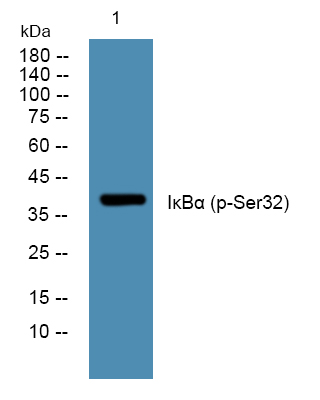IκB-α (Phospho Ser32) rabbit pAb
- Catalog No.:YP1372
- Applications:WB;IHC
- Reactivity:Human;Mouse;Rat
- Target:
- IκB-α
- Fields:
- >>cAMP signaling pathway;>>Chemokine signaling pathway;>>NF-kappa B signaling pathway;>>Apoptosis;>>Osteoclast differentiation;>>Toll-like receptor signaling pathway;>>NOD-like receptor signaling pathway;>>RIG-I-like receptor signaling pathway;>>Cytosolic DNA-sensing pathway;>>C-type lectin receptor signaling pathway;>>IL-17 signaling pathway;>>Th1 and Th2 cell differentiation;>>Th17 cell differentiation;>>T cell receptor signaling pathway;>>B cell receptor signaling pathway;>>TNF signaling pathway;>>Neurotrophin signaling pathway;>>Adipocytokine signaling pathway;>>Relaxin signaling pathway;>>Insulin resistance;>>Alcoholic liver disease;>>Epithelial cell signaling in Helicobacter pylori infection;>>Pathogenic Escherichia coli infection;>>Shigellosis;>>Salmonella infection;>>Legionellosis;>>Yersinia infection;>>Leishmaniasis;>>Chagas disease;>>Toxoplasmosis;>>Hepatitis C;>>Hepatitis B;>>Measles;>>Human cytomegalovirus infection;>>Influenza A;>>Human T-cell leukemia virus 1 infection;>>
- Gene Name:
- NFKBIA IKBA MAD3 NFKBI
- Protein Name:
- NF-kappa-B inhibitor alpha
- Human Gene Id:
- 4792
- Human Swiss Prot No:
- P25963
- Mouse Gene Id:
- 18035
- Mouse Swiss Prot No:
- Q9Z1E3
- Rat Gene Id:
- 25493
- Rat Swiss Prot No:
- Q63746
- Immunogen:
- Synthesized phosho peptide around human IκBα (Ser32)
- Specificity:
- This antibody detects endogenous levels of Human Mouse Rat IκBα (phospho-Ser32)
- Formulation:
- Liquid in PBS containing 50% glycerol, 0.5% BSA and 0.02% sodium azide.
- Source:
- Polyclonal, Rabbit,IgG
- Dilution:
- WB 1:500-2000;IHC 1:50-300
- Purification:
- The antibody was affinity-purified from rabbit serum by affinity-chromatography using specific immunogen.
- Concentration:
- 1 mg/ml
- Storage Stability:
- -15°C to -25°C/1 year(Do not lower than -25°C)
- Other Name:
- NF-kappa-B inhibitor alpha (I-kappa-B-alpha) (IkB-alpha) (IkappaBalpha) (Major histocompatibility complex enhancer-binding protein MAD3)
- Observed Band(KD):
- about 40kd
- Background:
- This gene encodes a member of the NF-kappa-B inhibitor family, which contain multiple ankrin repeat domains. The encoded protein interacts with REL dimers to inhibit NF-kappa-B/REL complexes which are involved in inflammatory responses. The encoded protein moves between the cytoplasm and the nucleus via a nuclear localization signal and CRM1-mediated nuclear export. Mutations in this gene have been found in ectodermal dysplasia anhidrotic with T-cell immunodeficiency autosomal dominant disease. [provided by RefSeq, Aug 2011],
- Function:
- disease:Defects in NFKBIA are the cause of ectodermal dysplasia anhidrotic with T-cell immunodeficiency autosomal dominant (ADEDAID) [MIM:612132]. Ectodermal dysplasia defines a heterogeneous group of disorders due to abnormal development of two or more ectodermal structures. ADEDAID is an ectodermal dysplasia associated with decreased production of pro-inflammatory cytokines and certain interferons, rendering patients susceptible to infection.,function:Inhibits the activity of dimeric NF-kappa-B/REL complexes by trapping REL dimers in the cytoplasm through masking of their nuclear localization signals. On cellular stimulation by immune and proinflammatory responses, becomes phosphorylated promoting ubiquitination and degradation, enabling the dimeric RELA to tranlocate to the nucleus and activate transcription.,induction:Induced in adherent monocytes.,online information:NFKBIA mutation
- Subcellular Location:
- Cytoplasm. Nucleus. Shuttles between the nucleus and the cytoplasm by a nuclear localization signal (NLS) and a CRM1-dependent nuclear export. .
- Expression:
- Brain,Kidney,Lymph node,Monocyte,
Electroacupuncture Prevents the Depression-Like Behavior by Inhibiting the NF-κB/NLRP3 Inflammatory Pathway in Hippocampus of Mice Subjected to Chronic Mild Stress Neuropsychobiology. ;:1-9. WB Mouse 1:1000 hippocampus
Aerobic exercise ameliorates particulate matter-induced lung injury in aging rats. ENVIRONMENTAL POLLUTION Environ Pollut. 2021 Mar;:116889 WB Rat 1 : 1000 Lung
Berberine hydrochloride attenuates lipopolysaccharide-induced endometritis in mice by suppressing activation of NF-κB signal pathway. INTERNATIONAL IMMUNOPHARMACOLOGY 2014 Nov 15 WB Mouse uteri
Buddleoside-rich Chrysanthemum indicum L. extract modulates macrophage-mediated inflammation to prevent metabolic syndrome induced by unhealthy diet BMC Complementary Medicine and Therapies Zhou Yiqing WB Rat liver tissue
- June 19-2018
- WESTERN IMMUNOBLOTTING PROTOCOL
- June 19-2018
- IMMUNOHISTOCHEMISTRY-PARAFFIN PROTOCOL
- June 19-2018
- IMMUNOFLUORESCENCE PROTOCOL
- September 08-2020
- FLOW-CYTOMEYRT-PROTOCOL
- May 20-2022
- Cell-Based ELISA│解您多样本WB检测之困扰
- July 13-2018
- CELL-BASED-ELISA-PROTOCOL-FOR-ACETYL-PROTEIN
- July 13-2018
- CELL-BASED-ELISA-PROTOCOL-FOR-PHOSPHO-PROTEIN
- July 13-2018
- Antibody-FAQs
- Products Images

- Western blot analysis of lysates from A431 cells, primary antibody was diluted at 1:1000, 4°over night

- Immunohistochemical analysis of paraffin-embedded human Gastric adenocarcinoma. 1, Antibody was diluted at 1:200(4° overnight). 2, Tris-EDTA,pH9.0 was used for antigen retrieval. 3,Secondary antibody was diluted at 1:200(room temperature, 45min).



